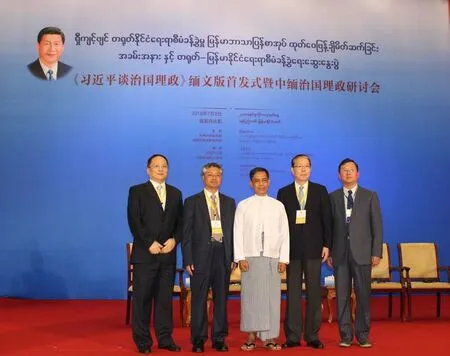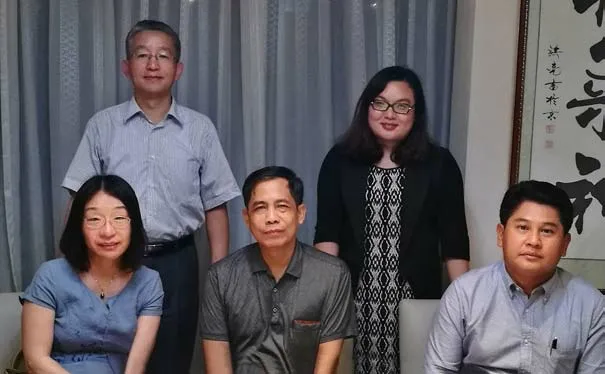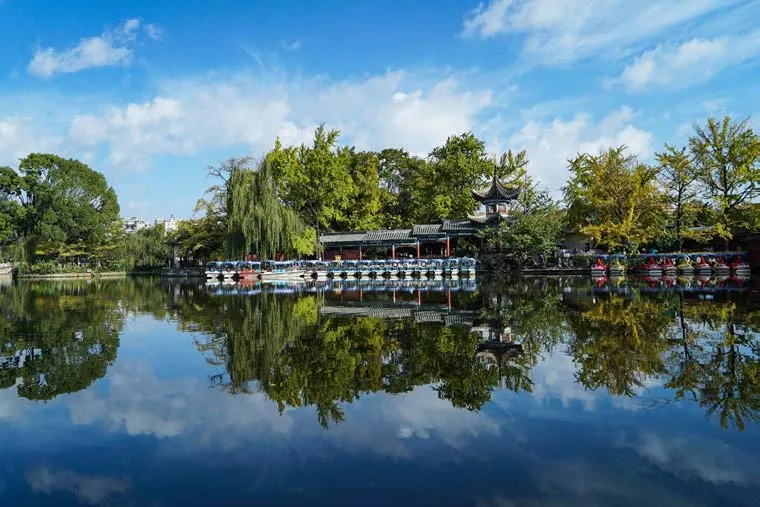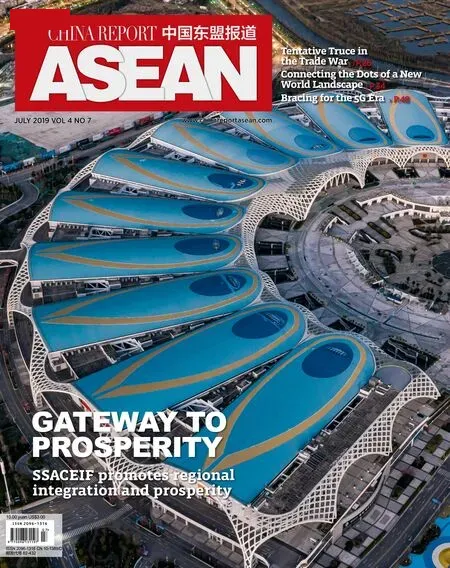FROM THE SAME TREE
By U Ko Ko Hlaing
A Myanmar scholar and his Chinese friends
M y early understanding of the People's Republic of China was drawn from a few books I read while growing up in a mountain village in Myanmar. I was particularly fascinated by The Other Side of the River and Red Star Over China, both written by American journalist Edgar Snow. Those books triggered great curiosity about China in me. Later,while serving in the army I was stationed in the northern and later eastern regions of Myanmar's Shan State, both bordering China, but still never found the chance to set foot in the country. During my service at army headquarters, I was assigned to conduct research on the situation in Myanmar's neighbors including China as well as other influential countries in the world. As I worked to study and analyze the development path of China,I became familiar with terms such as “Long March,” “Four Modernizations” and “One Country, Two Systems,” and my understanding of the country gradually deepened. I finally found the chance to visit China in 1997 as an English interpreter and recorder with a high-level Myanmar military delegation.
First Impressions
The Chinese People's Liberation Army (PLA)considered our visit tremendously important. After our aircraft landed in Kunming,capital of southwestern China's Yunnan Province, we boarded a 30-seat plane specially chartered by PLA to fly to Beijing. Following the Beijing visit, we toured several other Chinese major cities including Nanjing, Shanghai and Kunming. Alongside globally renowned scenic attractions such as the Great Wall, the Buddha's Tooth Relic Stupa and Mount Taishan, we also visited various military institutions and facilities supporting China's land, naval and air forces, drill bases and weapon research centers.
My first China visit left me impressed by the positive traits of the Chinese people. First was their spirit and morality. Back in the 1990s, China did not have as many cars as we see today.As dawn broke, the streets began to see endless streams of bicycles heading to different workplaces. After arriving at their workplace, people simply parked their bicycles on the roadside—some were even left unlocked without worries of theft. Likewise, nobody would pick flowers grown on the roadside or any other public space, which is admirable.

U Ko Ko Hlaing.

U Ko Ko Hlaing(center), China International Publishing Group Vice President Fang Zhenghui (second right), President of Yunnan University Lin Wenxun (second left), President of Foreign Languages Press Xu Bu (first left) and Professor Li Chenyang (first right) from Yunnan University at the launch ceremony of the Myanmar edition of Xi Jinping: The Governance of China in Nay Pyi Taw, July 9, 2018.
Second was the PLA troops'earnest attitude and strong sense of discipline. Due to weather conditions, we traveled by train instead of plane from Beijing to Nanjing.High-speed bullet trains were not yet around, but the regular trains were comfortable enough. They traveled fast and didn't shake that much.All the trains followed the timetable strictly, without exception, and wouldn't wait even for important passengers.At Nanjing station, our train was only allowed to wait three minutes, so the Chinese soldiers greeting us at the station removed our large volume of luggage at lightning speed. Every one of us marveled at their efficiency and capacity.
In Beijing, we stayed at a hotel near the embassy district. Whenever I passed a foreign embassy, I saw Chinese soldiers standing on guard in ceremonial position,completely motionless like a sculpture for hours, even during night shifts. The changing of the guard always proceeded precisely according to the rules, regardless of whether an yone w as watching.
And third, the Chinese people showed diligence. Our stay in Beijing was during summer, when day breaks very early. One day, I woke to see the first rays of the sun outside the window bouncing off commuters riding bicycles on the road. My watch indicated it was around three o'clock in the morning. “Is my watch broken?” “Did I forget to change it?” I rubbed my eyes and looked at my watch carefully.It turned out people indeed headed to work so early to beat rush hour. But for me, it was back to bed.
From that first China tour, I learned that under any political system, a nation's development largely relies on its people's hard work and their adherence to disciplines and rules.Though I couldn't tell you their names, I still maintain deep gratitude for our PLA friends.
My first China visit left me impressed by the positive traits of the Chinese people.
My Friends in Yunnan
Myanmar largely borders China through Yunnan Province, which is why many of my Chinese friends hail from Yunnan. My first close friend was Professor Li Chenyang, a scholar in Myanmar studies at Yunnan University. We first met at a seminar on Myanmar hosted by Professor Ian Holliday from the University of Hong Kong. Later, we met again in my Yangon office during my tenure as Chief Political Advisor of the Myanmar President's Office, and Professor Li invited me to visit China again to conduct investigation and academic exchange with Chinese research institutes.In May 2012, alongside some associates, I arrived at Yunnan University. By then, the school was China's only university with an academy specializing in Myanmar studies, and Professor Li was a senior expert at the academy. Wearing golden-framed glasses and always beaming with smiles,Li was already academically accomplished in Myanmar affairs and had authored a number of papers and books on Myanmar.
Thanks to his help, we established a profound partnership with Yunnan University, which allowed me to frequent the school's main campus in Kunming. Kunming is my favorite city, which is so close geographically to my hometown that it often feels intimate. Yunnan University is quite close to Cuihu Lake. I often spent early mornings walking in the park named after it. The stone-paved path along the bank of the lake was dotted with small pavilions surrounded by blooming flowers and trees,offering shade and shelter for people seeking a rest stop. From time to time, melodies from traditional flutes played by several elderly citizens filled the air, reminiscent of scenes from literary films.
Kunming is also home to a specialty that always makes me hungry. Featuring a mix of sour, sweet, salty and spicy taste at an affordable price, rice noodles are particularly popular among Myanmar gourmands, so much so that the dish obtained a homophonic name in the Myanmar language, as have many other Chinese foods favored by Myanmar foodies such as deepfried dough sticks and tofu.Because northern Myanmar is geographically adjacent to Yunnan, Yunnan rice noodles are commonplace in northern and central Myanmar cities like Mandalay. In the country's southern region, alongside rice noodles, people also like meat-stuffed buns, which were first introduced centuries ago by sea-voyaging merchants from southern Chinese coastal areas. Such history vividly testifies to relationship between geographical location and food culture.
Yunnan's connection with Myanmar is not just tastes, but also ethnicity and language. Of the 25 minority ethnic groups inhabiting Yunnan Province,many live in cross-border regions shared with Myanmar. All major language families spoken by Myanmar people can also be found in Yunnan. With the help of Yunnan University, I was able to get an intimate look at the Yi and Naxi people living in the ancient towns of Dali and Lijiang.
China's Belt and Road Initiative has created opportunities to accomplish win-win cooperation in the region. These days, mutual understanding between peoples is becoming even more important. The traditional“paukphaw” (fraternal)friendship shared by Chinese and Myanmar people has withstood the test of time,which inspired late Chinese Marshal Chen Yi to compose a poem to a Myanmar friend: “I live by the Yangtze River near its source, while you reside furthest down its course;you and I, though it seems,drink water out of the same stream.” Since the economic interests of the two peoples are now so closely interrelated,consolidating friendship and mutual understanding has only become more important.
Translating such a book,which delves so deeply into Chinese history, philosophy and politics, turned out to be a demanding job.
Like-minded Friends
I first read the English edition of the first volume of Xi Jinping:The Governance of China more than three years ago, after it was given to me by a Chinese friend during my official visit to China as Chief Political Advisor of Myanmar President's Office.I was completely fascinated by the book, which was different from anything else I had read on China because it so thoroughly and profoundly expounds on Chinese history, global policies,development path and national conditions. I decided to translate it into Myanmar language.
Translating such a book,which delves so deeply into Chinese history, philosophy and politics, turned out to be a demanding job. I thought of teaming up with Li Chenyang,who accepted my invitation enthusiastically. A translation task force involving both Chinese and Myanmar scholars was officially formed in April 2016. I led the Myanmar scholars who worked on translating the English version into the Myanmar language, while our Chinese colleagues headed by Li Chenyang and Professor Li Mou from Peking University were responsible for polishing the Myanmar-language draft based on the original Chinese content.

U Ko Ko Hlaing(front center) with reporters from China Report ASEAN.

Picturesque Cuihu Lake in Kunming,Yunnan Province.
The translation process was tough for two main reasons:Myanmar translations from English text were often widely different from versions translated from Chinese text,and connotations of specialized vocabulary were often quite confusing. The different political systems in the two countries made certain Chinese vocabulary and terms hardly comprehensible to Myanmar people. In addition, Confucius quotes and folk adages were also particularly difficult for translators.
As one of the first Chinese students to go to Myanmar to study in the 1950s, Li Mou is an expert at the Myanmar language. From his perspective,some Chinese idioms and metaphors would too easily confuse Myanmar readers,who would have no clue of context. Therefore, translators had to brainstorm equivalent expressions or add notes to avoid misunderstanding and ambiguity.
To accurately and faithfully translate the book, Li Chenyang and the rest of the Chinese team visited Myanmar several times,and I visited Beijing at least twice to participate in revisions and proofreading. Each time,we printed out the latest draft and repeatedly discussed key phrases face-to-face.
On July 9, 2018, the first volume of Xi Jinping: The Governance of China in Myanmar language was released in Nay Pyi Taw, capital of Myanmar.Co-published by China's Foreign Languages Press and Myanmar's Asian Fame Media Group, it was the first version of the book produced through international co-publication.Fruit of efforts of the Chinese-Myanmar translation team, the book received wide acclaim in Myanmar, and the Assembly of the Union of Myanmar added the book to its library collection.As a country undergoing transformation, Myanmar acutely needs to learn from China on governance.
In April 2019, I received a precious gift from China: the English version of the second volume of Xi Jinping: The Governance of China, which inspired me to work again with my Chinese counterparts to translate the book into the Myanmar language. Translation work has already begun.
Over the years, I have maintained close contact with many Chinese research institutes and nongovernmental organizations including China International Publishing Group, China Institute of Contemporary International Relations, China Foundation for Poverty Alleviation and China NGO Network for International Exchange. Communication with them has provided fascinating insight into Chinese media's dedication to international communication targeting ASEAN readers,Chinese think tanks' in-depth studies on the development of ASEAN countries, Chinese foundations' efforts to aid education for impoverished Myanmar college students,and Chinese nongovernmental organizations' contributions to poverty relief in Myanmar's rural areas, just to name a few things happening. The character and accomplishments of my Chinese friends have impressed me, and their endeavors to open new prospects for China-Myanmar diplomacy have produced valuable fruits.

